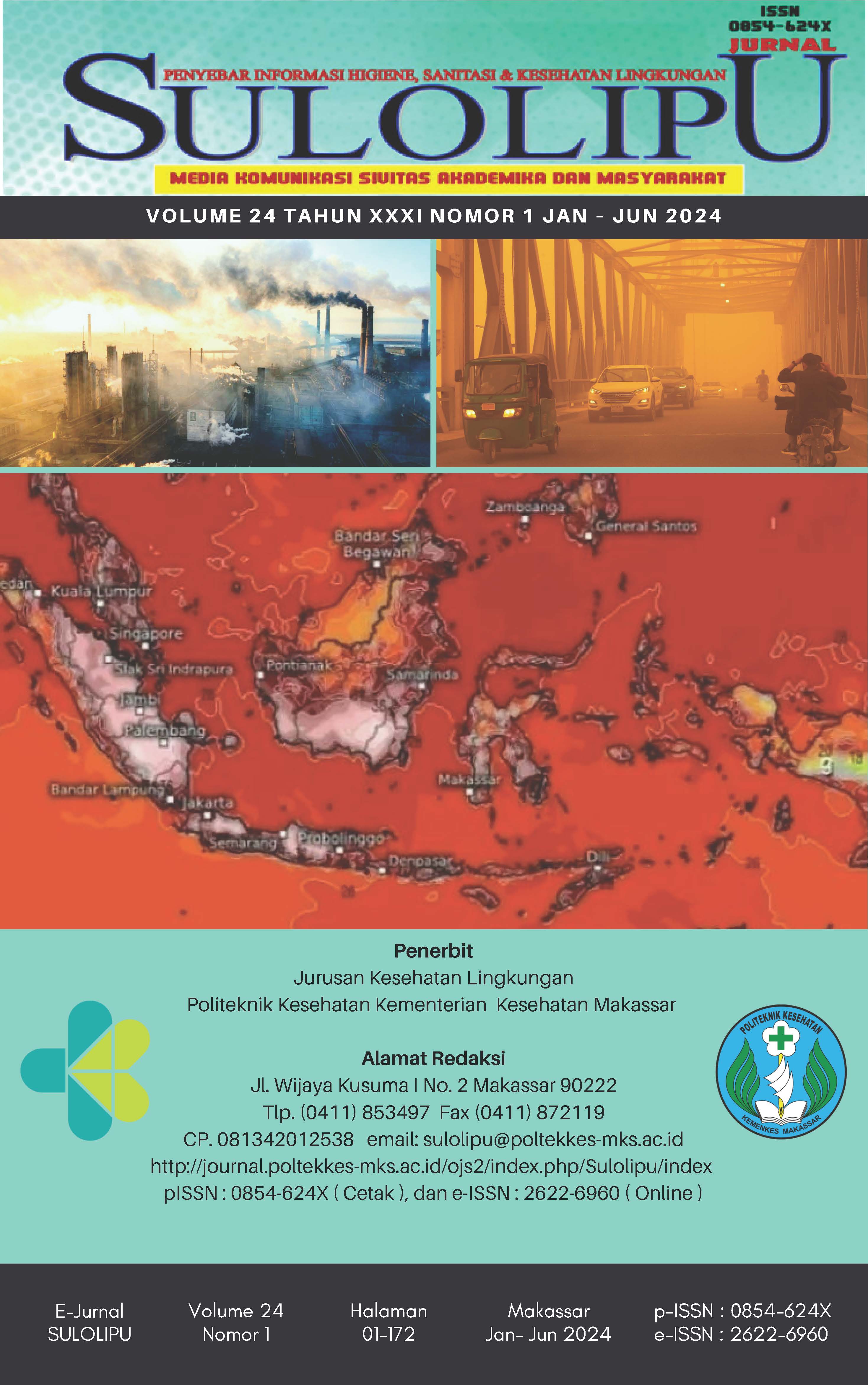Patient Satisfaction Level in the Implementation of Environmental Health Services at Islamic Hospitals Based on Sharia Minimum Quality Service Standards
DOI:
https://doi.org/10.32382/sulo.v24i1.504Keywords:
patient satisfaction, hospitals, Islamic servicesAbstract
Good quality health care is seen as the patient's right and is the responsibility of hospital personnel (Zineldin, 2006). The quality of service created by agencies or hospitals aims not only to increase patient satisfaction, but also to improve hospital standards and employee performance as well. Of course, it is not only oriented towards material commitment but is also carried out through practice as part of the value of worship (Yunus, 2012). To determine the relationship between the implementation of Islamic Health Services at RSI Cempaka Putih and Patient Satisfaction. This study is a quantitative research with a cross sectional method. Respondents filled out a questionnaire which was circulated through the inpatient manager which was then forwarded to the inpatient room, especially the post-surgical patient room. The data obtained was tested using the Spearman statistical test to see the correlation between variables and patient satisfaction. The sample of post-surgical inpatients consisted of 88 respondents. It was found that 54% of patients had high expectations for Islamic services. However, in reality, the majority of satisfaction figures for Islamic services are rated as quite satisfied, 73% and 25% satisfied. The results of the Spearman correlation test show that the implementation of sharia mandatory quality services at RSI Cempaka Putih on the satisfaction of post-surgical inpatients has a weak relationship but is not statistically significant. However, based on the results of the analysis of each question, a significant relationship was found between patient satisfaction and mandatory quality services, namely for the variable wearing a hijab for breastfeeding mothers. Meanwhile, in general, the implementation of minimum sharia services has an insignificant relationship with the satisfaction of post-surgical inpatients at RSI Cempaka Putih. Respondent satisfaction figures cannot be separated from the hospital's commitment to implementing Islamic services according to standards. The consistency of the implementation of Islamic services can be seen from how Islamic concepts are included in planning and actualization, there are verbal and written policies implemented by the hospital. Sharia/Islamic concepts must be present in the planning, both in the strategic plan (strategic plan) which is not limited to a vision and mission but is also actualized in 4 things, namely: balanced human resources, adequate budget, infrastructure mechanisms and clear authority. As a hospital that applies Syaria standard, it is also necessary to pay attention to aspects of environmental cleanliness and health.
References
Abdulqawi, O., & Owen, L. (2011). Adopting and measuring customer service quality (SQ) in Islamic banks: A case study in Kuwait finance house. International Journal of Islamic Financial Services, 3, 1–26.
Adisasmito, W. (2014). Sistem Kesehatan. Edisi Kedua. Raja Grafindo Persada.
Ali, I. Q. (2018). Analisis Pengaruh Pelayanan Syariah Terhadap Kepuasan Pasien (Studi Pada Rumah Sakit Islam Sultan Agung Semarang). Jurnal Ilmiah, 6(2), 1–9.
Alingh, C. W., van Wijngaarden, J. D. H., Huijsman, R., & Paauwe, J. (2018). The influence of environmental conditions on safety management in hospitals: a qualitative study. BMC Health Services Research, 18(1), 313. https://doi.org/10.1186/s12913-018-3116-8
Amin, M., & Nasharuddin, S. Z. (2013). Hospital service quality and its effects on patient satisfaction and behavioural intention. Clinical Governance, 18(3), 238–254. https://doi.org/10.1108/CGIJ-05-2012-0016
Azevedo, M. J. (2017). The State of Health System(s) in Africa: Challenges and Opportunities. In Historical Perspectives on the State of Health and Health Systems in Africa, Volume II: The Modern Era (pp. 1–73). https://doi.org/10.1007/978-3-319-32564-4_1
Dewan Syariah Nasional Majelis Ulama Indonesia. (2017). Buku Standar dan Instrumen Sertifikasi Rumah Sakit Syariah - MUKISI. MUKISI.
Irviana, F. (2019). Analisa Manajemen Rumah Sakit Syariah (Studi Aplikasi Kualitas Manajemen Syariah dalam Pelayanan Rumah Sakit terhadap Hifz Ad Din pada Rumah Sakit Bersertifikasi Syariah di Indonesia). Young Progressive Muslim.
Jeurissen, P. P. T., Kruse, F. M., Busse, R., Himmelstein, D. U., Mossialos, E., & Woolhandler, S. (2021). For-Profit Hospitals Have Thrived Because of Generous Public Reimbursement Schemes, Not Greater Efficiency: A Multi-Country Case Study. International Journal of Health Services : Planning, Administration, Evaluation, 51(1), 67–89. https://doi.org/10.1177/0020731420966976
Peraturan Menteri Kesehatan Nomor 7 Tahun 2019 tentang Kesehatan Lingkungan Rumah Sakit, (2019).
Mat, H., Wan Ab Rahaman, W. M. A. F. Bin, Shafie, N. B., & Syed Mohamed, S. T. Bin. (2021). Intention to Choose Syariah Compliant Hospital: The Role of Religiosity. Malaysian Journal of Social Sciences and Humanities (MJSSH), 6(8), 501–508. https://doi.org/10.47405/mjssh.v6i8.966
Mohammadi, A., Vanaki, Z., Memarian, R., & Fallahrafie, R. A. (2019). Islamic and Western Ethical Values in Health Services Management: A Comparative Study. International Journal of Nursing Knowledge, 30(4), 239–250. https://doi.org/https://doi.org/10.1111/2047-3095.12244
Mohidem, N. A., & Hashim, Z. (2023). Integrating Environment with Health: An Islamic Perspective. In Social Sciences (Vol. 12, Issue 6). https://doi.org/10.3390/socsci12060321
Mosadeghrad, A. M. (2012). A conceptual framework for quality of care. Materia Socio-Medica, 24(4), 251–261. https://doi.org/10.5455/msm.2012.24.251-261
Mukisi. (2024). RS Syariah Makin Diminati, Ini Jumlahnya Sampai Hari ini. https://mukisi.com/2251/rs-syariah-diminati-ini-jumlahnya/
Mulawarman, Aji Dedi Kamayanti, A., Manzilati, A., Djalaluddin, A., Sonhaji, S., Tumirin, Tumirin, Anggraini, F. S., & Nurindrasari, D. (2018). Akuntansi syariah untuk rumah sakit teori, prinsip, dan praktik. Rajawali Press.
Nasution, G., Fahmi Oemar, & Rinayanti Rasyad. (2024). Analysis of Patient Satisfaction in the Registration Section at the Regional General Hospital in Mandau District, Bengkalis Regency in 2023. Jurnal Manajemen Dan Bisnis Terapan, 5(1), 63–72. https://doi.org/10.31849/jmbt.v5i1.14551
Nofiyanti, S., Iskandar, I., & Mulfianda, R. (2020). Efektifitas Pelayanan Kesehatan Islami Terhadap Kepuasan Pasien di Ruang Rawat Inap. Jurnal Ilmu Keperawatan, 8(1), 54–65.
Sa’adah, H. (2022). Konsep Rumah Sakit Syariah Dalam Transformasi Ekonomi Syariah. Jurnal Ekonomi Syariah, 1(2), 153–172. ejournal.staialutsmani.ac.id/itishom
Satria, A., & Wijiharta. (2017). Implementasi Budaya Organisasi Islami Di Rumah Sakit Islam Yogyakarta PDHI Yogyakarta. At-Tauzi: Jurnal Ekonomi Islam, 17(2), 73–84.
Swain, S., & Kar, N. C. (2018). Hospital service quality as antecedent of patient satisfaction – a conceptual framework. International Journal of Pharmaceutical and Healthcare Marketing, 12(3), 251–269. https://doi.org/10.1108/IJPHM-06-2016-0028
Syafaat, A. K. S., Qaiser Abdul Kareem Hamoode, & Muwahid. (2023). Implementation of Shariah Hospital Management Fatwa and Good Corporate Governance Principles: Another Fact from Shariah Hospital. Jurnal Hukum Islam, 21(2), 415–442. https://doi.org/10.28918/jhi_v21i2_08
Taqdees, F., Sahahab Alam, M., & Shabbir, A. (2017). Hospital Healthcare Service Quality, Patient Satisfaction and Patient Loyalty: An Investigation in context of Private Healthcare Systems of Pakistan. International Journal of Quality & Reliability Management, 35(6), 1195–1214.
Downloads
Published
How to Cite
Issue
Section
PDF (Bahasa Indonesia) downloaded: 678






















